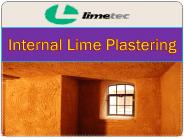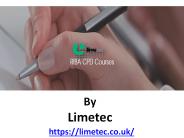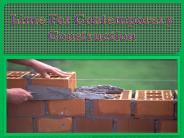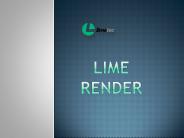Limes PowerPoint PPT Presentations
All Time
Recommended
A Danube Limes projekt www.danube-limes.eu www.danube-limes.eu
| PowerPoint PPT presentation | free to view
Title: PowerPoint Presentation Author: kresic Last modified by: kresic Created Date: 10/25/2004 3:00:19 PM Document presentation format: On-screen Show
| PowerPoint PPT presentation | free to view
Lime render has been used in construction of building and has been dated as far back to the 4th century and is still used today in modern new builds.
| PowerPoint PPT presentation | free to download
The report provides an in-depth analysis of the Lemons and limes Market in Brazil. It presents the latest data of the market value, consumption, domestic production, exports and imports, price dynamics and food balance.
| PowerPoint PPT presentation | free to download
Lime mortar benefits in the modern world of Construction https://limetec.co.uk/hydraulic-lime-mortars/
| PowerPoint PPT presentation | free to download
Limetec is the UK supplier of Otterbein Lime Renders. Our traditional lime renders allow your building to breathe when applied to brick or dense masonry.
| PowerPoint PPT presentation | free to download
A mixture that looks uniform when stirred or shaken that separates into ... Lemons, limes, vinegar, and dill pickles. Indicator: ...
| PowerPoint PPT presentation | free to view
Limetec NHL 3.5 Moderately Hydraulic Lime Mortar (HLM 3.5) can be used for permeable masonry materials which is mainly used above ground.
| PowerPoint PPT presentation | free to download
Control of mite vectors and trimming of infected branches account ... Affects limes, grapefruit, and trifoliates most severely. ...
| PowerPoint PPT presentation | free to download
Limetec lime putty is produced by slaking Quicklime in an excess of water. Our lime putty is mainly used for old buildings, and historic properties where maximum permeability and flexibility is required.
| PowerPoint PPT presentation | free to download
Horticulture is regarded as having started in Tanzania in the 1950s ... Limes. Mangoes. Oranges. Passion Fruit. Pears. Pineapples. Raspberries. Strawberries ...
| PowerPoint PPT presentation | free to view
Distinguish between homogeneous mixtures and heterogeneous mixtures. Compare and contrast the properties ... lemon and limes (citric acid) Vinegar (acetic acid) ...
| PowerPoint PPT presentation | free to view
Simple Photo Re-touching. Maybe we don't like the brown spot on LimeCat's lime. ... This website has a large number of free Photoshop tutorials and tips. ...
| PowerPoint PPT presentation | free to view
Fruit Salad Shapes. How many are LEMONS are hiding under the SQUARE, if the total ... How many LIMES are hiding under the DIAMOND if the total is 8? DIAMOND ...
| PowerPoint PPT presentation | free to download
Do your muscles ever feel sore after a heavy workout? ... Think of the taste of fruits such as lemons or limes. These fruits contain citric acid. ...
| PowerPoint PPT presentation | free to view
Ataturk's Army : democrats' foe vs seculars' friend. Turkey as a model for Islam vs ... The Slippery slope argument: including not excluding Europe's limes ...
| PowerPoint PPT presentation | free to view
'Value of the Animals in the Rainforest' ... The rainforests in Europe has 134 ... lemons, limes, oranges, cucumbers, tea, cashews, pineapples, and papayas. ...
| PowerPoint PPT presentation | free to view
One-half of all growing wood on earth is located in the tropical ... lemons, limes, oranges, cucumbers, tea, cashews, pineapples, and papayas. Some Spices are: ...
| PowerPoint PPT presentation | free to view
Cornish Lime: Limes for specialist application in conservation. Business Link has been approached for support to develop a kiln for lime production in Bodmin ...
| PowerPoint PPT presentation | free to view
The requirements for totally hydraulic limes and all hydraulic concretes is to ... For carbonating eco-cements and lime mortars on the on the hand the matrix must ' ...
| PowerPoint PPT presentation | free to view
Download free PDF Sample@ https://bit.ly/2BC00CJ #ChemicalsAndMaterials #Chemicals #MarketAnalysis #LimeOil #Oil Lime Oil can be made from cold pressed peel and distilled peel,mainly used for blending lemon, citrus and other fruit flavor drinks with essence.Since the COVID-19 virus outbreak in December 2019, the disease has spread to almost 100 countries around the globe with the World Health Organization declaring it a public health emergency. The global impacts of the coronavirus disease 2019 (COVID-19) are already starting to be felt, and will significantly affect the Lime Oil 3900 market in 2020.
| PowerPoint PPT presentation | free to download
The industry report package Lime Markets in the World to 2017 - Market Size, Trends, and Forecasts offers the most up-to-date perspective on the actual market situation, trends, and future outlook for limes in different countries around the world. The studies include historic market data from 2006 to 2012 and forecasts until 2017 which makes the reports an invaluable resource for industry executives, marketing, sales and product managers, analysts, and other people looking for key market insights in a readily accessible and clearly presented format. For More Details: http://www.researchonglobalmarkets.com/lime-markets-in-the-world-to-2017-market-size-trends-and-forecasts.html
| PowerPoint PPT presentation | free to download
We pride ourselves on supplying the finest lime mortar at competitive prices, backed up by friendly technical advice and aftercare. We have our expert team with over a decade of experience specialising in the conservation of listed buildings, offering practical advice based on real-world experience.
| PowerPoint PPT presentation | free to download
Our marketing package has everything you need to run an ICO campaign: company blog, listing on ICO trackers, marketing on social media, crypto community management, bounty programs, targeting marketing and an advisors search. The number of ICOs being launched in increasing every day and the right team can help your ICO to succeed. We're that team.
| PowerPoint PPT presentation | free to download
Now test Raw Lime Cheescake Slice!
| PowerPoint PPT presentation | free to download
The promotion of modern gypsum-based plasters has led to the almost complete demise of lime plastering, and of many of the traditional skills associated with the craft. This has been exacerbated by the plastering trade being divided into flat and decorative work
| PowerPoint PPT presentation | free to download
We pride ourselves on supplying the finest lime mortar at competitive prices, backed up by friendly technical advice and after care. We have our own expert team with over a decade of experience specialising in conservation of listed buildings, offering practical advice based upon real world experience.
| PowerPoint PPT presentation | free to download
Lord Nut Levington offers highly seasoned gourmet peanuts. Peanut flavors include: Hot Spicy Mary, Hot Buffalo, Zesty Chilli Lime, White Cheddar Jalapeño, Thai Curry Lemongrass. Shop for Peanuts now!
| PowerPoint PPT presentation | free to download
Our RIBA CPD presentation on the Benefits of lime mortar is interactive seminar with samples of our lime mortar materials and the benefits of use for building renovation, restoration and sustainability.
| PowerPoint PPT presentation | free to download
Lime Mortar has been used in the construction of buildings for over 2000 years, and used on the most iconic historical landmarks across the world. For example, the Great Wall of China, the Houses of Parliament and Rome Colosseum. These historical buildings are still here today, due to its unique beneficial properties.
| PowerPoint PPT presentation | free to download
Lime Mortar has been used in the construction of buildings for over 2000 years, and used on the most iconic historical landmarks across the world. For example, the Great Wall of China, the Houses of Parliament and Rome Colosseum. These historical buildings are still here today, due to its unique beneficial properties.
| PowerPoint PPT presentation | free to download
Our mortars are ready mixed at our state of the art factory. This removes the possibility of inconsistent colour and strength that can occur during site mixing.
| PowerPoint PPT presentation | free to download
Otterbein lime plasters not only offer sustainable benefits, but breathability and flexibility for the building. They can reduce site work times by a massive 75% to traditional application
| PowerPoint PPT presentation | free to download
Limepoint is a lime pointing mortar designed specifically for pointing joints by a modern mortar gun or bag injection.
| PowerPoint PPT presentation | free to download
Find out why London Lime Mortar is changing the way for listed buildings across London
| PowerPoint PPT presentation | free to download
Limepoint is a lime pointing mortar designed specifically for pointing joints by a modern mortar gun or bag injection. Limepoint is perfect solution for stone cladding walls or for conventional wall, which require repointing.
| PowerPoint PPT presentation | free to download
In the world of construction and property development, quality matters. From the foundation to the finishing touches, every element of a building project plays a crucial role in determining its long-term value and durability.
| PowerPoint PPT presentation | free to download
The Histocal range are 100% free from cement and perfect for historic buildings and monuments. They harden slowly and are flexible so they will absorb movement. They have natural capillarity and a high water vapor diffusion capacity to enable substrates to lose moisture quickly through the Histocal plaster.
| PowerPoint PPT presentation | free to download
When people refer to lime mortar they're generally referring to mortar made with hydraulic lime or fat lime putty, sand and no cement. However, for most modern bricklayers and builders, the only exposure they've had to lime products is hydrated lime.
| PowerPoint PPT presentation | free to download
Ready mixed colour hydraulic lime mortars are the perfect choice for listed buildings and conservation areas which require repairs or new builds.
| PowerPoint PPT presentation | free to download
A lime binder must be cured once it has been placed because it requires time to fully hydrate before it acquires strength and hardness. Curing is the process of keeping the mortar/render under a specific environmental condition until hydration is relatively complete
| PowerPoint PPT presentation | free to download
Our mortars are ready mixed at our state of the art factory. This removes the possibility of inconsistent colour and strength that can occur during site mixing.
| PowerPoint PPT presentation | free to download
Otterbein lime renders are used in sustainable building as well as historic building preservation and restoration. They are manufactured in Germany to the highest quality standards and are subject to continuous in-plant and third party monitoring. They are vapor permeable with good capillarity and flexibility. Our products can be sprayed by machine or applied by hand.
| PowerPoint PPT presentation | free to download
Lime mortar has been used in the construction of buildings for over 2000 years, and has been used on the world most iconic historical landmarks across the world; for example, the Great Wall of China, the Houses of Parliament and the Colosseum. These historical buildings are still here today, due to its beneficial properties.
| PowerPoint PPT presentation | free to download
A damp building can cost a considerable amount of time and money to put right. Damp allows mold and fungi to prosper, which is directly linked to respiratory problems and affect asthma sufferers .
| PowerPoint PPT presentation | free to download
hydraulic lime has been used as a binder for brick, stones and masonry for thousands of years. Before 1900 nearly all buildings constructed across Europe will have been built using it, and many parts of Europe are still using it for new builds.
| PowerPoint PPT presentation | free to download
Hair or Fibres have traditionally been used as reinforcement in lime renders as a means of improving tensile strength and to reduce shrinkage cracking. Introduced into the mix by teasing the hair into the mix prior to the mortars use. This is a time-consuming job as it involves teasing the hair into the mix as it is mixed. Clumps of hair simply cannot be placed into the mixer as they will remain in the mix as large balls of hair and will not part no matter what type or method of mixing is used.
| PowerPoint PPT presentation | free to download
Natural Hydraulic Lime mortar consists of two building materials, lime and sand. They can be used for a variety of applications for laying brickwork, bedding tiles, rendering and plastering
| PowerPoint PPT presentation | free to download
The use of natural lime mortars and renders has increased considerably in recent years compared to just a couple of decades ago. These simple, basic materials are fundamentally important to the long term survival of historic buildings, yet there are many who still regard their use with suspicion.
| PowerPoint PPT presentation | free to download
The benefits of using lime to create a vapour open construction are well known for historic solid walled buildings, however its use in modern construction is not so well documented.
| PowerPoint PPT presentation | free to download
A damp building can cost a considerable amount of time and money to put right. Damp allows mold and fungi to prosper, which is directly linked to respiratory problems and affect asthma sufferers .
| PowerPoint PPT presentation | free to download
A damp building can cost a considerable amount of time and money to put right. Damp allows mold and fungi to prosper, which is directly linked to respiratory problems and affect asthma sufferers . Old buildings, are most vulnerable to damp, due to being built with porous material such as; cob, stone and rab, which will hold moisture within the walls of the structure.
| PowerPoint PPT presentation | free to download
Lath and plaster is a building technique used mainly for interior walls in period buildings. A lath is a narrow strip of wood approximately 2 inches wide which is nailed horizontally to each stud in the frame.
| PowerPoint PPT presentation | free to download
Lime render has been used in construction of building and has been dated as far back to the 4th century and is still used today in modern new builds.
| PowerPoint PPT presentation | free to download
On new lime renders and plasters it unifies and protects the surface particularly while strength is developing within the new plaster.
| PowerPoint PPT presentation | free to download
Pointing is the action of filling the gap between masonry units (joints) with a mortar to protect the masonry from water ingress and associated decay.Before any work begins it is important to observe how the wall was originally built and take note of this
| PowerPoint PPT presentation | free to download
























































